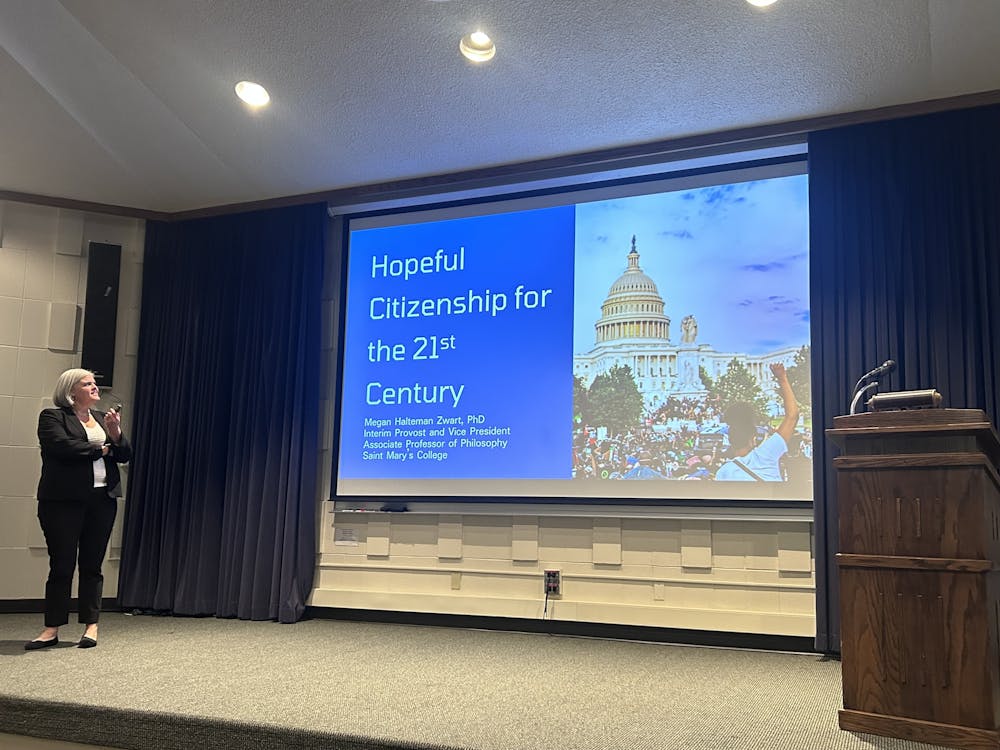On Wednesday evening, professor Megan Halteman Zwart, interim provost at Saint Mary’s College, delivered a lecture in Carroll Auditorium focused on effective strategies for engaging in meaningful dialogue across differences. As the founding director of the Dialogue Project, Zwart drew from her research to address the challenges posed by political polarization, highlighting several crises that threaten democratic discourse.
Zwart’s research on the topic began when she recognized the desire for a class on discourse between individuals with diverse ideologies. She created the course and has been teaching it since 2017.
“[The class] brings together students to build skills for dialog across differences, and then to practice those skills on the most controversial topics of the day,” Zwart said. “And you might think, who in this culture wants to do something like that, but it actually has been some of the most transformative teaching that I’ve done.”
She began her lecture with an overview of topics that define the current state of political discourse. Zwart used societal political polarization as an overarching theme for these issues, and identified several crises that threaten an individual’s ability to participate in democratic discussions.
“[These] crises shake our faith in our democratic order’s ability to make good decisions or give us a functional democracy,” she said.
The first crisis Zwart identified was distraction. She said that the majority of the population spends an excessive amount of time on the internet, which introduces an abundance of threats, many of which come from algorithms.
“The way in which the algorithms are engineered is to keep you keep your eyeballs there which means you’re going to get more and more emotion, inducing material which is going to sort of push you in a direction,” Zwart said.
Next, Zwart spoke on the crisis of polarization. She identified a primary issue as the sorting and stacking of identities.
“It used to be that you couldn’t really guess that much about somebody from some particular political viewpoint that they held, but now you can basically guess all their political viewpoints,” she said.
Zwart asserted that confirmation bias leads to the proliferation of outrage culture, which ultimately leads to loss of trust.
“If we think that the other half of the country is trying to destroy a thing that we care about, and then our flourishing depends on it, then those people are not just people physically, they are actually built for threatening,” she said.
The last of the crises Zwart identified was extremism.
Zwart described that as the gap between beliefs has grown and polarization has increased, the dichotomy of views has become more prominent within the nation’s political culture. “You feel very at odds with the other people you share the country with,” she said. “They seem not just like people who disagree, but people who are sort of evil or villainous.”
Zwart defined her tools to combatting these crises as "virtues for hopeful citizenship."
“What I think is most transformative for me and my students is to think about the fact that we have the power to grow virtues in ourselves and dispositions in ourselves,” Zwart said.
One virtue she mentioned was empathy and the importance of listening to understand.
“We all think we’re good listeners, but almost none of us really are,” Zwart said.
She also urged students to turn their defensiveness into curiosity.
“It’s an absolute superpower for diffusing this kind of conflict,” Zwart said.
Another of Zwart’s virtues was intellectual humility, which she stressed as important in finding the gaps in your knowledge and getting outside of your comfort zone to gain perspective.
“We should be always seeking the opportunity to figure out what somebody else knows that we don’t know, and how somebody else has experienced has led to their viewpoints in a way that ours hasn’t,” Zwart said.
The final virtue Zwart discussed was courage. She urged attendees to speak up when something matters.
“Democracy needs people of conviction. We want people to care about issues. We want to speak up for things that matter, and want them to promote their vision of the best world,” Zwart said.
Zwart concluded her discussion with a piece of advice to anyone who wishes to enhance their abilities in meaningful discourse.
“When you can see your views throughout your experiences, you can translate that to understanding someone else’s views and their experiences, it’s much easier for you to hold that those two things are different.”










